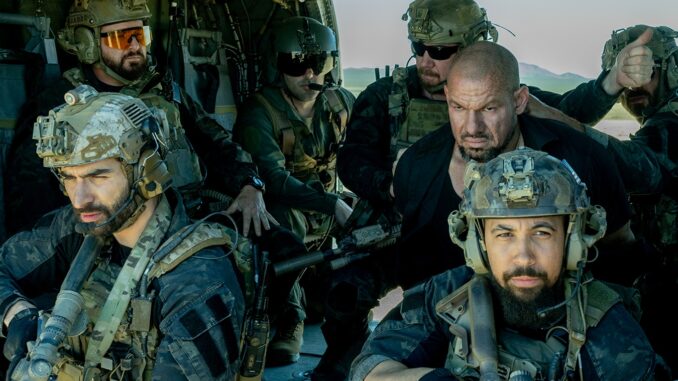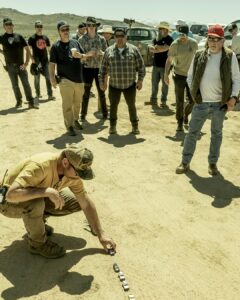
Introduction: The Ultimate Fighting Lesson in SEAL Team’s Season Finale
The season finale of SEAL Team is always an emotional rollercoaster, and this year was no exception. As fans watched the team face unimaginable challenges, one important lesson stood out above all else: the importance of constantly improving your fighting game. In a world where danger is always lurking, the ability to adapt and grow—both on the battlefield and in life—is critical.
In this season finale recap, we’ll dive deep into the critical moments of the episode and highlight how the theme of “always improve your fighting game” permeated every decision the characters made. From tactical decisions to personal growth, this finale showed the SEALs doing what they do best—improving themselves for the next mission, the next challenge, and the next fight.
What Happened in the SEAL Team Season Finale?
Tactical Challenges That Tested the Team’s Strength
The season finale started with the team gearing up for one of their most dangerous missions yet. As they infiltrated hostile territory, it became clear that the stakes had never been higher. The team faced tactical challenges that tested their resolve, their training, and their ability to think on their feet.

Key Moment: The Decision to Adapt Mid-Mission
At the height of the mission, the SEALs had to make a split-second decision—one that could make or break the operation. This decision required them to draw on their experience, adapt to the situation, and ultimately improve their game to ensure mission success. What was so powerful about this moment wasn’t just the action—it was the constant underlying reminder that adaptability and growth are essential to survival in the SEALs and in life.
The Theme of ‘Always Improve Your Fighting Game’
It’s Not Just About Physical Combat
While the SEAL Team finale was full of intense combat scenes, the message of the episode extended far beyond physical battles. The phrase “always improve your fighting game” reflects a broader philosophy—one that’s about growth, learning, and resilience. This idea is central to the SEAL ethos, but it’s also a valuable lesson for anyone facing challenges in their lives.
Personal Growth and Team Dynamics
Throughout the season, the characters have been tested, not just in combat, but emotionally and psychologically. As they face the consequences of their actions, both on and off the field, they are forced to evolve. This personal growth is mirrored by their increasing effectiveness as a team, highlighting the importance of adapting to new circumstances and improving oneself constantly.
Key Character Growth: Jason Hayes and His Struggle
Jason Hayes (played by David Boreanaz) faces a personal crisis that challenges his ability to lead. In the finale, he learns that to improve his fighting game, he must first confront his internal struggles—his anger, his trauma, and his need for control. This vulnerability humanizes him and shows that even the most seasoned warriors need to continue evolving to be effective leaders and soldiers.
The Tactical Importance of Continuous Improvement
From Training to Real-Life Operations: The SEALs’ Approach
The SEAL Team is often portrayed as the pinnacle of military excellence, and for good reason. Their training is grueling, their missions are dangerous, and their lives depend on constant refinement of their skills. But what sets them apart is their commitment to always improving, even after they’ve achieved a level of expertise.
Ongoing Training: The Key to Success
In real life, Navy SEALs are known for never resting on their laurels. They undergo continuous training, even when not deployed, to stay sharp. The same can be said for the characters on SEAL Team. Despite their elite status, they know that there’s always room for improvement—whether it’s enhancing their tactical decision-making, improving teamwork, or becoming more attuned to their own emotional needs.
In the finale, this theme is explored through the team’s interactions and the lessons they learn about themselves and each other. It’s a reminder that growth is ongoing, and the best warriors never stop working to improve.
How the Finale Showed Real-Life Lessons
Embracing Vulnerability for Growth
One of the most profound lessons from the finale is the idea that vulnerability and growth go hand in hand. As the characters face their toughest challenges, they’re forced to let go of their egos and accept help from others. Whether it’s through leaner communication with their team or making tough personal decisions, the season finale emphasizes that growth isn’t just about gaining new skills—it’s also about becoming more self-aware and open to change.
Real-Life Application: Learning from Failures
Another powerful lesson the show presents is that failure is not the end. It’s simply part of the process of improvement. The team experiences setbacks, both personal and tactical, but these failures become stepping stones toward their next success. In life, we often fear failure, but SEAL Team teaches us that it’s through failure that we find our strength and learn how to adapt.
Character Dynamics and the Evolution of Leadership
Jason Hayes’ Role as a Leader
Jason Hayes’ journey throughout the season is the perfect example of how leadership can evolve. His ability to reflect on his weaknesses and learn from his past mistakes demonstrates that even the most seasoned leaders need to continuously improve.
A Leadership Lesson for the Team
The season finale also showcased the growing leadership abilities of other characters, including Ray and Clay. As the team works together to improve their collective mission effectiveness, each member steps up in their own way, embracing the need to evolve not just as soldiers, but as individuals.
Key Moment: Ray’s Rise as a Trusted Leader
Ray (played by Neil Brown Jr.) proves to be a strong leader in the finale. His ability to communicate openly with the team, show vulnerability, and make tough decisions elevates his status within the group. It’s a testament to the idea that leadership doesn’t come from dominance but from the ability to adapt, listen, and lead with empathy.
The Final Takeaway: Improving Your Fighting Game
How ‘SEAL Team’ Challenges Us to Reflect
In the end, the lesson of the SEAL Team season finale isn’t just for the SEALs on screen—it’s for all of us. No matter what challenges we face, there’s always room for improvement. Whether you’re fighting literal battles on the frontlines or metaphorical battles in your personal or professional life, the key is never to stop growing. Just like the SEALs, we must be constantly honing our skills, pushing ourselves to the next level, and learning from every experience.
Conclusion: A Season Finale That Teaches More Than Action
The SEAL Team season finale was full of action, suspense, and emotion, but it was also packed with valuable life lessons. The central theme of always improving your fighting game rang loud and clear. Whether it was through tactical decisions, personal growth, or evolving leadership, the finale reminded viewers that success doesn’t come from staying the same—it comes from constant adaptation and improvement.
As we close this chapter, one thing is certain: the journey for Jason, Ray, Clay, and the rest of the team is far from over, and neither is the journey for us as individuals. We’re all in the fight of our lives, and just like the SEALs, we must never stop improving.
FAQs
1. What was the key lesson in the SEAL Team season finale? The key lesson was the importance of constantly improving your fighting game, both physically and mentally, in order to succeed in high-stakes situations.
2. How did Jason Hayes evolve as a character in the season finale? Jason learned to confront his internal struggles and accept help from his team, showing that vulnerability and self-awareness are key to becoming a better leader.
3. How does SEAL Team reflect real-life Navy SEAL training? The show emphasizes the importance of continuous training and improvement, portraying the SEALs’ commitment to growing their skills even after achieving elite status.
4. How did the team’s dynamics change in the season finale? The team’s dynamics evolved as members took on more leadership roles and learned to communicate openly and work together to overcome challenges.
5. What can viewers learn from the season finale of SEAL Team? Viewers can learn that failure is part of the process and that continuous improvement—both personally and professionally—is essential for success in any field.